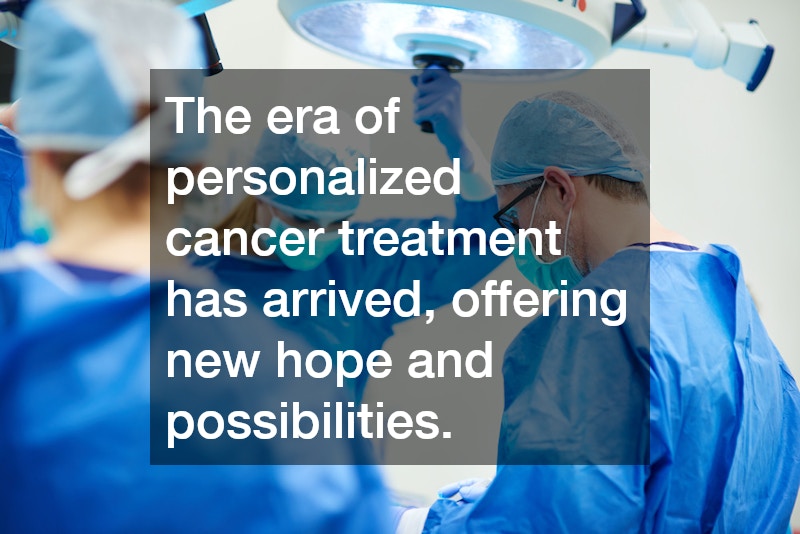How Cancer Doctors Personalize Treatment Plans for Better Outcomes


Cancer treatment has seen significant advancements over the years. However, one aspect that has revolutionized outcomes is the personalized approach that cancer doctors now employ. Understanding the specific needs of each patient, and tailoring treatment plans accordingly, has led to better outcomes and improved quality of life for patients.
Understanding the Patient’s Unique Profile
The first step in personalizing cancer treatment is understanding the patient’s unique profile. Cancer doctors take into account a variety of factors, including the type and stage of cancer, overall health, and genetic markers.
This comprehensive evaluation helps in crafting a treatment plan that is specifically suited to the patient’s needs. It ensures that the treatments administered are not only effective but also minimize unnecessary side effects. By focusing on the patient’s unique profile, doctors can make informed decisions that drive positive outcomes.
Patient histories, including family medical records, play a crucial role in this process. Genetic predispositions can offer vital clues into how a patient’s cancer may behave and respond to treatment. Technologies such as next-generation sequencing allow cancer doctors to identify genetic mutations that can be targeted with specific therapies. This level of customization was unimaginable just a few decades ago. Today, it represents a cornerstone of personalized cancer treatment.
Moreover, emotional and psychological factors are also considered in tailor-making treatment plans. Cancer doctors understand that mental health plays a pivotal role in physical recovery. Therefore, they often incorporate psychological support as a part of the holistic treatment plan. By considering the mental and emotional state of patients, they aim to support not just the body but also the mind. Comprehensive treatments lead to improved patient satisfaction and are crucial for long-term success.
Utilizing Cutting-Edge Technologies
Another critical component of personalized cancer treatment is the use of cutting-edge technologies. Advanced diagnostics and imaging tools provide cancer doctors with a detailed picture of the tumor and its biological properties. Technologies such as radiomics, machine learning, and artificial intelligence (AI) have begun to be integrated into diagnostics, offering unprecedented levels of precision. By leveraging these technologies, doctors can better understand how a particular cancer is likely to behave and respond to different treatments.
These technologies also enable the continuous monitoring of treatment efficacy. Cancer doctors can swiftly adjust treatment plans based on real-time data, improving the chances of successful outcomes. For example, if imaging technologies reveal that a tumor is not responding to a specific drug, the treatment can be adjusted promptly. This adaptability is key to ensuring that personalized treatment plans remain effective over time. Such advancements have transformed cancer treatment from a generic, one-size-fits-all approach to a highly tailored process.
Moreover, personalized medicine has expanded into areas such as immunotherapy and targeted therapy. These treatments are designed to work with a patient’s immune system or target specific cancer cells, respectively. Cancer doctors can exploit these therapies by identifying which patients are most likely to benefit from them based on their genetic markers. This targeted approach not only enhances treatment efficacy but also significantly reduces side effects. In doing so, personalized medicine enhances quality of life during and after treatment.
Collaborating with Multidisciplinary Teams
Personalization in cancer treatment often involves a multidisciplinary team of specialists. Cancer doctors collaborate with surgeons, radiologists, pathologists, and even psychologists to devise a holistic treatment plan. Each professional brings a unique expertise that contributes to a more nuanced understanding of the patient’s condition. By working together, this team can devise a treatment plan that is comprehensive and highly individualized. Such collaboration ensures that all facets of the patient’s health are addressed, leading to better overall outcomes.
The role of a multidisciplinary team becomes even more vital when considering the complex nature of cancer. Each type of cancer, and indeed each cancer case, may require different forms of treatment. In this context, input from various specialists allows cancer doctors to identify the most effective treatment combinations. This collaborative approach not only improves the efficacy of treatment but also empowers patients by ensuring that every angle of their health is considered. By pooling their expertise, these teams create a robust treatment strategy.
The patient also becomes an integral part of the multidisciplinary team. Cancer doctors encourage active participation from patients in their treatment decisions. This partnership fosters an environment of trust and boosts patient morale, both essential components in the road to recovery. Patients are more likely to adhere to a treatment plan they understand and have had a role in shaping. Furthermore, this co-active approach often leads to innovations in treatment plans, underlining the enormous potential of personalized cancer care.
Personalization in cancer care is a transformative approach that has revolutionized cancer treatment. By understanding each patient’s unique profile, utilizing cutting-edge technologies, and collaborating with multidisciplinary teams, cancer doctors are achieving better outcomes than ever before. This personalized approach minimizes the physical and emotional burdens of treatment, significantly enhancing patient satisfaction and quality of life.
The future of cancer treatment lies in further refining these personalized strategies. Continued advancements in technology and a deeper understanding of cancer biology will only improve the efficacy and precision of treatments. As personalized medicine becomes increasingly integral to cancer care, cancer doctors will continue to play a crucial role in adapting and implementing these innovative strategies.
Overall, the era of personalized cancer treatment has arrived, offering new hope and possibilities. With each tailored treatment plan, cancer doctors are not just treating the disease but are also nurturing the well-being of the individual. This holistic and personalized approach embodies the essence of modern oncology, setting the stage for even more breakthroughs in the fight against cancer.
.
